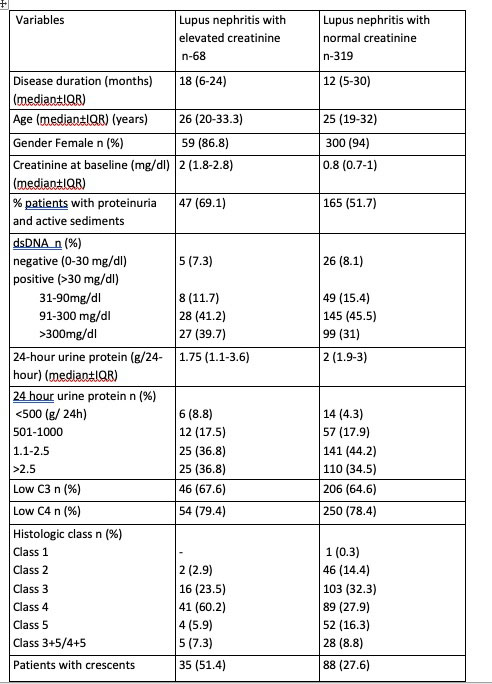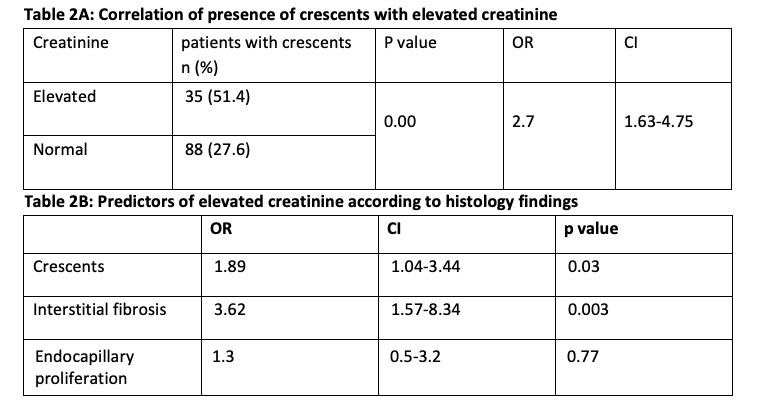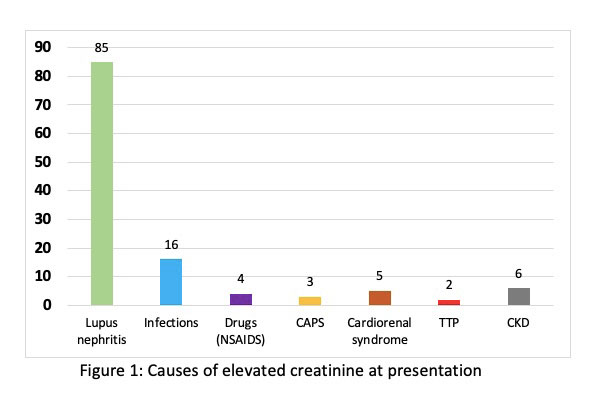Session Information
Date: Sunday, November 13, 2022
Title: SLE – Diagnosis, Manifestations, and Outcomes Poster II: Manifestations
Session Type: Poster Session C
Session Time: 1:00PM-3:00PM
Background/Purpose: Systemic lupus erythematosus (SLE) commonly involve kidney, with increase in creatinine due to lupus related or unrelated cause. Renal biopsy remains gold standard in diagnosis of lupus nephritis (LN). Higher number of crescents had a significantly worse prognosis compared to no crescents. In this study, we analysed the causes of raised serum creatinine in patients with SLE at presentation and assessed association of number of crescents with renal failure.
Methods: This was a retrospective single centre observational study where medical records of all SLE patients visiting tertiary care hospital 2001 to 2021 was reviewed. Data was retrieved from the case sheets, clinic files and electronic health records using the hospital information system. The cause of raised serum creatinine (serum creatinine >1.5 mg/dl) was assessed. Renal biopsy of patients with impaired renal function was compared with renal biopsy of LN patients presenting with normal renal function. Biopsies were analysed to found correlation between renal failure and presence of crescents. Data was analysed using Strata 14, p value of < 0.05 was taken as statistically significant.
Results: 1606 SLE clinic files were screened, of which 121 patients had elevated creatinine at presentation. Amongst the causes of elevated creatinine, lupus nephritis was most common (70.2%, 85/121) followed by infections (13. 2%, 16/121) (Figure 1). 68 renal biopsies of patient with elevated creatinine were compared with 319 renal biopsies with normal creatinine (Table 1). Proportion patients with presence of crescents was significantly higher in group with elevated serum creatinine compared to group with normal serum creatinine (51.4% vs 27.6%, p: 0.0001 and also, presence of crescents correlated with worsening renal function [OR: 2.7 (1.63-4.75)] (Table 2A). Interstitial fibrosis and endocapillary proliferation were predictors of elevated serum creatinine in our cohort. (Table 2B)
Conclusion: Apart from lupus nephritis as cause for increased creatinine, infections should always be screened. Crescents have significant association with elevated creatinine and timely and aggressive management in such patients can give favourable outcome.
To cite this abstract in AMA style:
Kharbanda R, Lawrence A, Aggarwal A. Etiology of Elevated Serum Creatinine in Patients with Systemic Lupus Erythematosus at Presentation and Association of Crescents in Renal Biopsy with Rapidly Progressive Renal Failure in a Lupus Cohort [abstract]. Arthritis Rheumatol. 2022; 74 (suppl 9). https://acrabstracts.org/abstract/etiology-of-elevated-serum-creatinine-in-patients-with-systemic-lupus-erythematosus-at-presentation-and-association-of-crescents-in-renal-biopsy-with-rapidly-progressive-renal-failure-in-a-lupus-cohor/. Accessed .« Back to ACR Convergence 2022
ACR Meeting Abstracts - https://acrabstracts.org/abstract/etiology-of-elevated-serum-creatinine-in-patients-with-systemic-lupus-erythematosus-at-presentation-and-association-of-crescents-in-renal-biopsy-with-rapidly-progressive-renal-failure-in-a-lupus-cohor/



